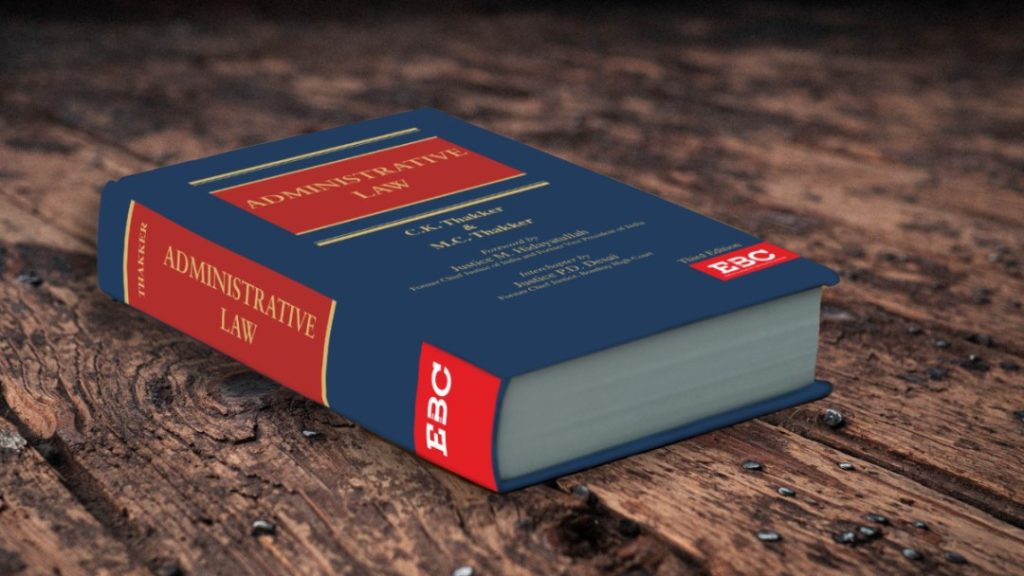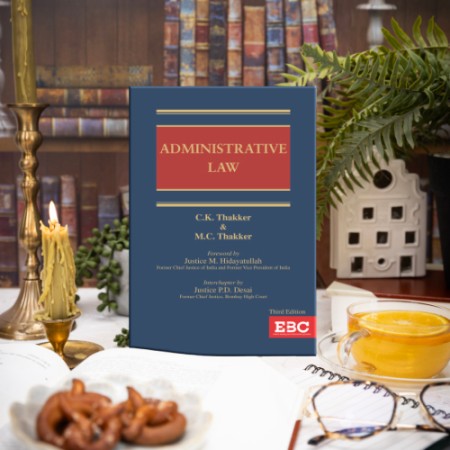
Administrative law forms the backbone of modern governance in India. It defines how public authorities exercise their powers and how citizens can hold them accountable. For students, practitioners, and academicians seeking clarity and depth in this vast field, Administrative Law (3rd Edition) by Justice C.K. Thakker remains one of the most trusted and insightful texts available today
Why Justice C.K. Thakker’s Book Stands Out

Justice Thakker’s work is renowned for its authoritative commentary and practical insight. Written by a respected jurist, the book bridges the gap between theory and practice, making complex legal doctrines understandable and relevant to modern governance. It doesn’t just describe administrative mechanisms — it interprets the constitutional principles that guide them, reflecting on fairness, accountability, and the separation of powers.
Core Concepts in Administrative Law
1. Delegated Legislation
The book offers a detailed analysis of how and why legislative powers are delegated to administrative bodies. Justice Thakker explains the need for flexibility in modern governance, while also emphasizing judicial checks that prevent misuse of power.
2. Principles of Natural Justice
One of the pillars of administrative law, natural justice ensures fairness in administrative decision-making. The author elucidates the classic rules — audi alteram partem (hear the other side) and nemo judex in causa sua (no one should be a judge in their own cause) — and shows how Indian courts have expanded these principles over time.
3. Administrative Tribunals
The rise of tribunals has transformed the landscape of administrative justice in India. Thakker’s analysis covers their formation, powers, and constitutional status, including key judicial pronouncements that define their role within the separation of powers framework.
4. Judicial Review and Writ Jurisdiction
Perhaps the most vital feature of the book is its comprehensive treatment of judicial review. Justice Thakker explains how High Courts exercise writ jurisdiction under Articles 226 and 227, ensuring that public authorities remain within their legal limits.
The book highlights remedies available to individuals and illustrates how writs like mandamus, certiorari, and prohibition safeguard fundamental rights.
5. Doctrine of Legitimate Expectation & Proportionality
These doctrines represent the evolution of fairness in administrative law. Thakker’s commentary makes complex judicial reasoning accessible, showing how legitimate expectation protects citizens from arbitrary decisions and how proportionality ensures that administrative actions are just and balanced.
Landmark Case: Royer Mathew v. South Indian Bank Ltd.
The latest edition includes a detailed discussion of the Supreme Court’s decision in Royer Mathew v. South Indian Bank Ltd., which clarified the scope of direct appeals to the Supreme Court from administrative tribunals.
This case marks an important step in defining judicial oversight over specialized tribunals, reinforcing the principle of constitutional accountability.
Justice Thakker’s interpretation connects this judgment with broader themes such as access to justice, judicial hierarchy, and the constitutional balance between Parliament and the Judiciary.
Key Features of the Book
- Authoritative Commentary: Written by a Supreme Court Judge, the book provides unmatched judicial insight and credibility.
- Contemporary Coverage: Incorporates recent Supreme Court decisions on tribunals, public corporations, and proportionality.
- Practical Relevance: Demonstrates how High Courts use writ jurisdiction to check State action.
- Balanced Approach: Merges academic theory with real-world application, making it equally valuable for students and practitioners.
Who Should Read This Book
This book is indispensable for:
- Law Students preparing for university exams or competitive tests
- Judges and Lawyers seeking clear references on complex administrative principles
- Government Officers and Public Administrators understanding their legal limits
- Researchers and Academicians exploring evolving doctrines in public law
Essentially, anyone dealing with State accountability, governance, or constitutional interpretation will find this text an invaluable guide.
In an era of increasing governmental regulation and public accountability, administrative law ensures that no authority acts above the Constitution.
Justice Thakker’s book captures this spirit — reminding us that the rule of law is not merely a legal concept, but the foundation of just governance.
As India continues to expand its administrative framework through new regulators, tribunals, and agencies, understanding these principles isn’t optional — it’s essential.
Administrative Law by Justice C.K. Thakker remains more than a reference book — it’s a guide to understanding the balance between power and accountability in a constitutional democracy.
Whether you’re a student beginning your legal journey or a practitioner refining your understanding, this work offers the clarity, authority, and depth needed to master the subject.
















